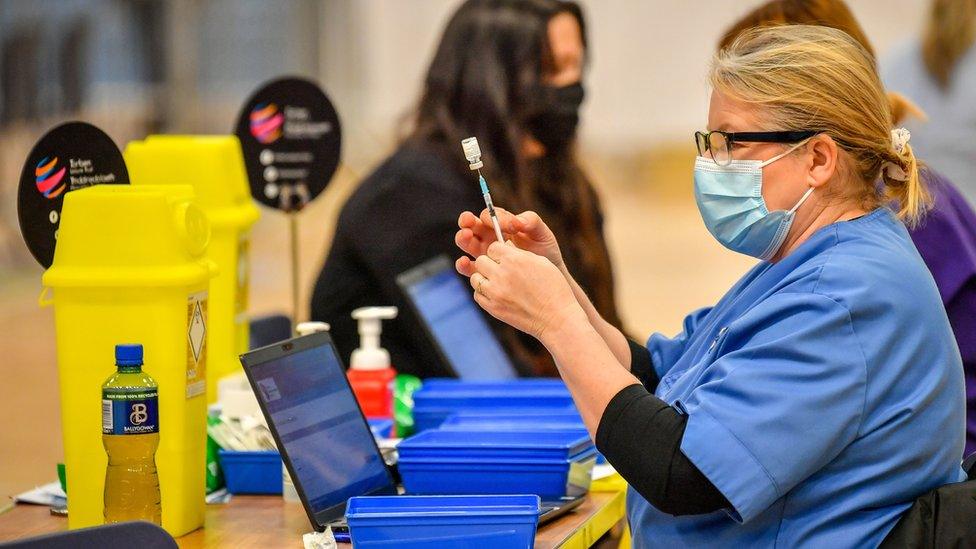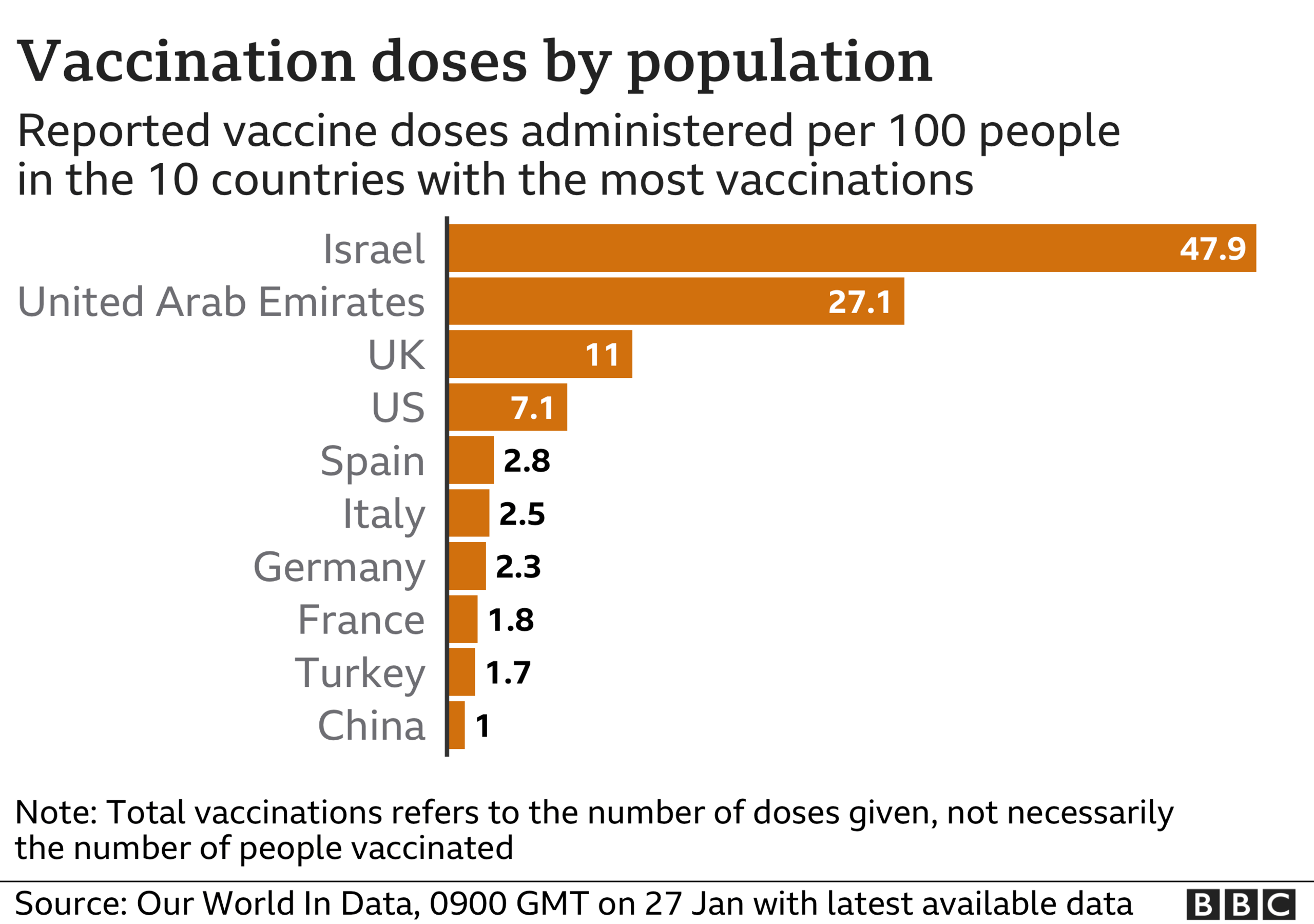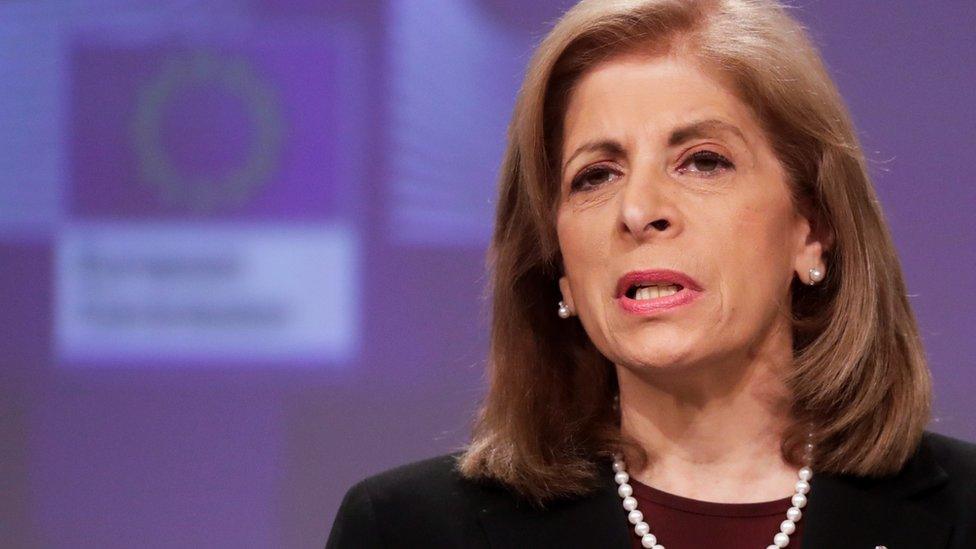Covid: UK vaccine supplies 'won't be interrupted' - Gove
- Published

There "will be no interruption" to UK vaccine supplies, Cabinet Office minister Michael Gove has said, after the EU urged AstraZeneca to supply it with doses from UK plants.
"It is the case that the supplies that have been planned, paid for and scheduled should continue," he added.
The EU and AstraZeneca are involved in a row over vaccine supply shortages.
Meanwhile, Germany's vaccine committee has said the AstraZeneca vaccine should only be given to people aged under 65.
It cited a lack of sufficient data to recommend use in older age groups.
The EU has demanded that UK-made jabs are diverted to mainland Europe to fulfil contractual obligations.
AstraZeneca has previously said it could deliver only a fraction of the doses between January and March that it had promised to the bloc, blaming production issues at EU plants for a reported 50 million-dose shortfall.
However, they have both pledged to work together to resolve the crisis.
Mr Gove said the UK must continue with the "acceleration" of its vaccine rollout, which relies on "the supply schedule that has been agreed to be honoured".
He told BBC Radio 4's Today programme that "we all want to do everything possible" to ensure that as many people in neighbouring countries are vaccinated, which he said was best achieved through "dialogue and co-operation and friendship".
Pressed on whether the government will allow vaccines to go to the EU, he said: "No", adding that vaccine supplies "that have been planned, paid for and scheduled should continue.
"There will be no interruption to that."
The prime minister's official spokesman said it "remains our priority to vaccinate the most vulnerable across the UK" when asked whether No 10 was considering the idea of sending jabs to the EU.
Asked to clarify what he meant by "most vulnerable", he said that meant the top nine groups identified as most at risk - all those over 50, care home and health service staff and others at clinical risk - and the plan remained to vaccinate them by spring.
He would not comment on whether that meant vaccines manufactured in the UK could be delivered to the EU after that date.


Sir Jeremy Farrar, a member of the UK government's Scientific Advisory Group for Emergencies (Sage), said it was in the UK's "national interests" to ensure as many people in the world as possible were vaccinated.
Asked if vaccine nationalism was a reality in Europe, he told the Today programme: "Yes, I'm afraid it is and it's something that we absolutely have to negotiate, we have to avoid, and it doesn't serve anybody to have these fights over vaccine supply."


The UK government is taking a firm line on this - and for good reason it believes.
It invested in the research done by Oxford University that developed this jab and was then quick to sign a deal with AstraZeneca for supply.
The deal was done in May, three months before the EU signed its contract.
That gave the UK a head start.
The UK supply is manufactured here - at plants in Oxfordshire and Staffordshire.
Some doses were sent to Germany and the Netherlands last year for a process called fill-and-finish, which involves putting it into vials. This is now being done at a plant in Wrexham, creating a complete UK supply chain.
And that arrangement, AstraZeneca sources say, had no impact on the production problems the EU vaccine manufacturing plants experienced.
Making a vaccine is a biological process - there are no guarantees in terms of quantity.
The fact the UK was quick off the mark gave the UK plants more time to tweak the process to get a better yield.
If the UK was to give the vaccine to the EU, why not then other countries? And would that be right when more than 1,000 people a day are dying with Covid here?

Labour leader Sir Keir Starmer said the "war of words" between the EU and AstraZeneca has "got to be resolved". He told LBC Radio that he wanted to rectify the issue by "ramping up manufacture" globally, but he did not want a solution that would "interrupt" the UK's vaccination effort.
AstraZeneca has blamed supply issues on manufacturing problems in two plants - one in Belgium and another in the Netherlands.
The EU, which signed a deal for 300 million doses in August, said it should not receive fewer doses just because the UK signed a contract with the UK-Swedish company earlier. EU Health Commissioner Stella Kyriakides said AstraZeneca's two UK plants "had to deliver" doses.
'High levels of protection'
Responding to Germany's recommendation that the AstraZeneca jab should only be given to the under 65s, Dr Mary Ramsay, head of immunisations at Public Health England, said: "Both the AstraZeneca and Pfizer-BioNTech vaccines are safe and provide high levels of protection against Covid-19, particularly against severe disease.
"There were too few cases in older people in the AstraZeneca trials to observe precise levels of protection in this group, but data on immune responses were very reassuring."
An AstraZeneca spokesperson said the latest analyses of clinical trial data for its vaccine "support efficacy in the over 65 years age group", adding that the firm was awaiting "a regulatory decision on the vaccine by the European medicines Agency (EMA) in the coming days".
Prime Minister Boris Johnson said he was not concerned by Germany's recommendation, adding that the UK's watchdog, the Medicines and Healthcare products Regulatory Agency (MHRA), had "made it very clear" that the AstraZeneca vaccine gives a "high degree of protection after just one dose, and even more after two doses".
He added: "The evidence that they've supplied is that they think it is effective across all age groups [and] provides a good immune response across all age groups, so I don't agree with that [Germany's recommendation]."

The UK government has promised to to deliver a first vaccine dose to 15 million of the most vulnerable by mid-February and to offer all adults their first dose by autumn.
Latest figures show that more than 7.1 million people in the UK have now received a first jab.

LOCKDOWN: The rules in your area
TESTING: How do I get a virus test?
LOOK-UP TOOL: How many cases in your area?
TRAVEL: What are the UK's rules?

Asked about Labour's calls for teachers to be vaccinated over half-term, Mr Gove said the government wanted to concentrate on vaccinating "the most vulnerable first", adding that any decision on who should be prioritised next would be based on scientific advice.
He reiterated comments from England's deputy chief medical officer, Prof Jonathan Van-Tam, by saying that schools "were in themselves safe" but that children could pass on the virus to each other and then back into the community.
Prof Van-Tam also told Wednesday's Downing Street briefing there was not a "markedly increased rate of infection or mortality" from Covid-19 among teachers.
However, Labour's deputy leader, Angela Rayner, has contested that, saying that teachers "by virtue of them having to go out and do a frontline facing job, are more at risk of catching Covid".
Pressed on why she was bringing herself into conflict with the scientific advice, she told the Today programme she said data showed "all frontline key workers, including teachers... are more at risk of infection and death - that's a fact".
The UK recorded a further 1,239 deaths within 28 days of a positive coronavirus test on Thursday, according to government figures. There have also been another 28,680 new infections.
In other developments:
Scotland is "on track" to meet its Covid-19 vaccine targets, First Minister Nicola Sturgeon has said
One in three police officers has been threatened by someone who they believed had coronavirus, a survey suggests
Scientists behind a study tracking coronavirus in England say there are signs of a "shallow decline" in infection levels
Welsh Secretary Simon Hart says a UK-wide policy for reopening schools would make sense
Black MPs from across the parties have joined together in a video encouraging people to get a Covid vaccine


Have you been affected by vaccine supply issues? Share your experiences by emailing haveyoursay@bbc.co.uk, external.
Please include a contact number if you are willing to speak to a BBC journalist. You can also get in touch in the following ways:
WhatsApp: +44 7756 165803
Tweet: @BBC_HaveYourSay, external
Please read our terms & conditions and privacy policy
If you are reading this page and can't see the form you will need to visit the mobile version of the BBC website to submit your question or comment or you can email us at HaveYourSay@bbc.co.uk, external. Please include your name, age and location with any submission.
Related topics
- Published28 January 2021
